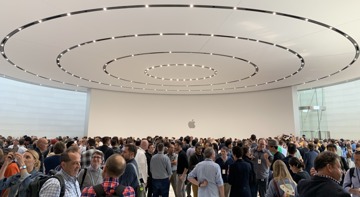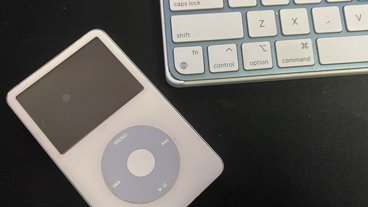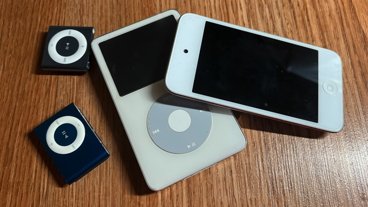During his panel at the WSJD live conference on Monday, Apple chief Tim Cook explained the reasoning behind the discontinuation of the iPod classic, which remained largely unchanged for six years until last month.
Speaking with Wall Street Journal editor Gerry Baker, Cook said Apple was no longer able to source parts for the capacious iPod, which was the last of its kind to integrate a spinning hard drive for storing up to 160GB worth of music. He confirmed that development of a replacement model would not be pursued, reports Engadget
"We would have to make a whole new product," Cook said. "The engineering work to do that would be massive. The number of people who wanted it is very small."
While Apple did not officially announce it would be discontinuing production of the iPod classic, the company quietly removed the device from its website and online store shortly after September's iPhone event.
The iPod classic was a design carryover from the music player's heyday and was most recently modified in 2009. Aside from a few aesthetic tweaks, however, the functional bits remained untouched for more than six years.
With the iPod classic's demise, Apple now fields a total of three iPod models — iPod shuffle, iPod nano and iPod touch — all flash-based devices with storage capacities maxing out at 64GB.
 AppleInsider Staff
AppleInsider Staff








 Charles Martin
Charles Martin
 Christine McKee
Christine McKee
 Wesley Hilliard
Wesley Hilliard
 Malcolm Owen
Malcolm Owen
 Andrew Orr
Andrew Orr
 William Gallagher
William Gallagher
 Sponsored Content
Sponsored Content








85 Comments
Wasn't the iPod Classic still a strong seller, even just a few years ago due to it's large capacity and classic click wheel interface? Although I understand iPod sales have been on a steady decline due to cannibalization by iPhone.
iPod Touches should come with optional capacities of 32Gb, 64Gb, 128Gb, 256Gb, 512Gb..hell even 1Tb. I would pay top dollar for a 1Tb iPod Touch!
This doesn't surprise me. Even though the article did not specifically call out which component had the most sourcing difficulties, for years Apple has been the last remaining OEM customer for the 1.8" hard drive format, and Toshiba was the last manufacturer. The 1.8" hard drive had seen no improvements or new R&D for at least three years, and with sales on the decline I'm actually surprised that the iPod classic lasted as long as it did. We've had rumors of its pending demise for about three years, so it's been on borrowed time for a while now.
This doesn't surprise me. Even though the article did not specifically call out which component had the most sourcing difficulties, for years Apple has been the last remaining OEM customer for the 1.8" hard drive format, and Toshiba was the last manufacturer. The 1.8" hard drive had seen no improvements or new R&D for at least three years, and with sales on the decline I'm actually surprised that the iPod classic lasted as long as it did. We've had rumors of its pending demise for about three years, so it's been on borrowed time for a while now.
Apple must have simply bought a huge batch a few years ago, and made Classics till they ran out.
You DID make a whole new product. It’s called the iPod touch.
This is true. Does anyone really keep their iPod classic around because they like the click wheel? Or just because they like 160 gigs?
And this is a serious problem. It should have been fixed YEARS ago. I don’t care what investment it should have taken; Apple should be investing not only into denser NAND, but faster NAND. Should have begun years ago, since it affects all their computers now.
Note that the iPod classic could have received a simple update to 240 gigabytes. FIVE YEARS AGO. It would have meant returning to the old new thick case (as opposed to the current, now old, new thin case from the last model they made), but it would have been possible. It also would have given the iPod classic complete, unquestioned, unassailable dominance in the mobile music capacity department (as well as the immobile, plug it into my kick-awesome stationary house stereo for ALAC playback department) for even the foreseeable future today. Apple probably could have made a single order of 240 gig drives back then and still not be out of them today. But then it’s a question of margins and userbase.